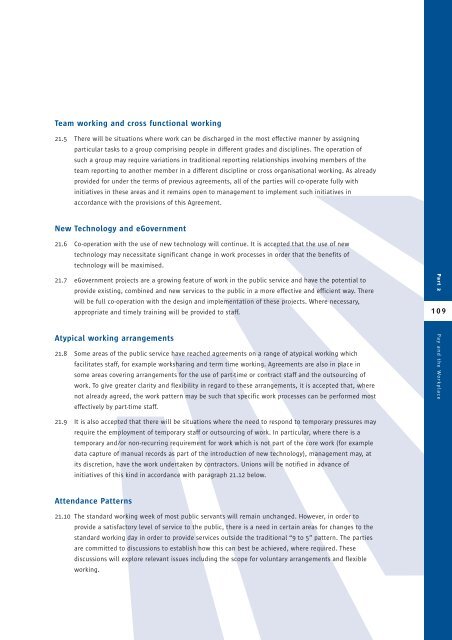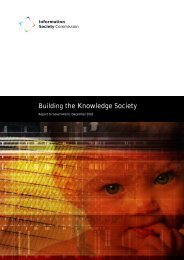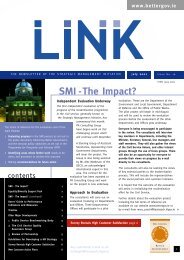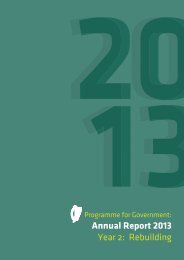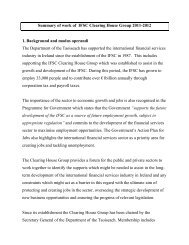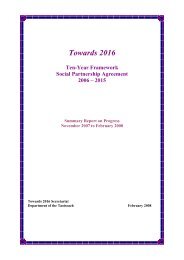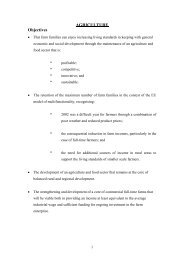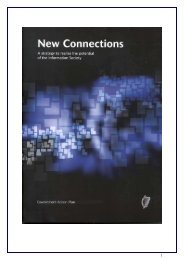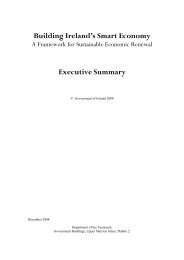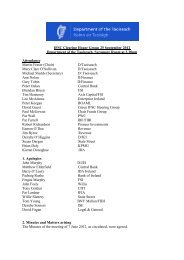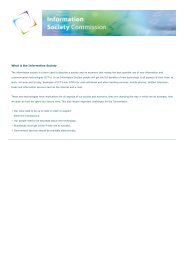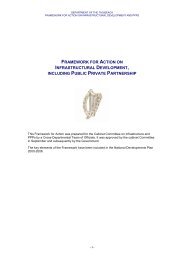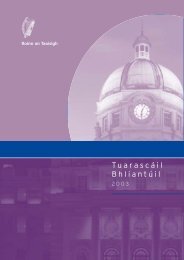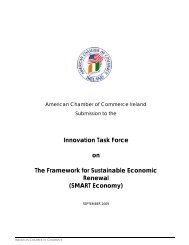Sustaining Progress - Department of Taoiseach
Sustaining Progress - Department of Taoiseach
Sustaining Progress - Department of Taoiseach
Create successful ePaper yourself
Turn your PDF publications into a flip-book with our unique Google optimized e-Paper software.
Team working and cross functional working<br />
21.5 There will be situations where work can be discharged in the most effective manner by assigning<br />
particular tasks to a group comprising people in different grades and disciplines. The operation <strong>of</strong><br />
such a group may require variations in traditional reporting relationships involving members <strong>of</strong> the<br />
team reporting to another member in a different discipline or cross organisational working. As already<br />
provided for under the terms <strong>of</strong> previous agreements, all <strong>of</strong> the parties will co-operate fully with<br />
initiatives in these areas and it remains open to management to implement such initiatives in<br />
accordance with the provisions <strong>of</strong> this Agreement.<br />
New Technology and eGovernment<br />
21.6 Co-operation with the use <strong>of</strong> new technology will continue. It is accepted that the use <strong>of</strong> new<br />
technology may necessitate significant change in work processes in order that the benefits <strong>of</strong><br />
technology will be maximised.<br />
21.7 eGovernment projects are a growing feature <strong>of</strong> work in the public service and have the potential to<br />
provide existing, combined and new services to the public in a more effective and efficient way. There<br />
will be full co-operation with the design and implementation <strong>of</strong> these projects. Where necessary,<br />
appropriate and timely training will be provided to staff.<br />
Atypical working arrangements<br />
21.8 Some areas <strong>of</strong> the public service have reached agreements on a range <strong>of</strong> atypical working which<br />
facilitates staff, for example worksharing and term time working. Agreements are also in place in<br />
some areas covering arrangements for the use <strong>of</strong> part-time or contract staff and the outsourcing <strong>of</strong><br />
work. To give greater clarity and flexibility in regard to these arrangements, it is accepted that, where<br />
not already agreed, the work pattern may be such that specific work processes can be performed most<br />
effectively by part-time staff.<br />
21.9 It is also accepted that there will be situations where the need to respond to temporary pressures may<br />
require the employment <strong>of</strong> temporary staff or outsourcing <strong>of</strong> work. In particular, where there is a<br />
temporary and/or non-recurring requirement for work which is not part <strong>of</strong> the core work (for example<br />
data capture <strong>of</strong> manual records as part <strong>of</strong> the introduction <strong>of</strong> new technology), management may, at<br />
its discretion, have the work undertaken by contractors. Unions will be notified in advance <strong>of</strong><br />
initiatives <strong>of</strong> this kind in accordance with paragraph 21.12 below.<br />
Attendance Patterns<br />
21.10 The standard working week <strong>of</strong> most public servants will remain unchanged. However, in order to<br />
provide a satisfactory level <strong>of</strong> service to the public, there is a need in certain areas for changes to the<br />
standard working day in order to provide services outside the traditional “9 to 5” pattern. The parties<br />
are committed to discussions to establish how this can best be achieved, where required. These<br />
discussions will explore relevant issues including the scope for voluntary arrangements and flexible<br />
working.<br />
Part 2 Pay and the Workplace<br />
109


